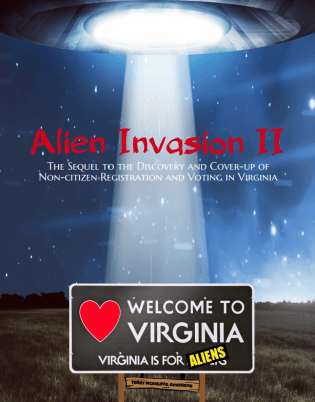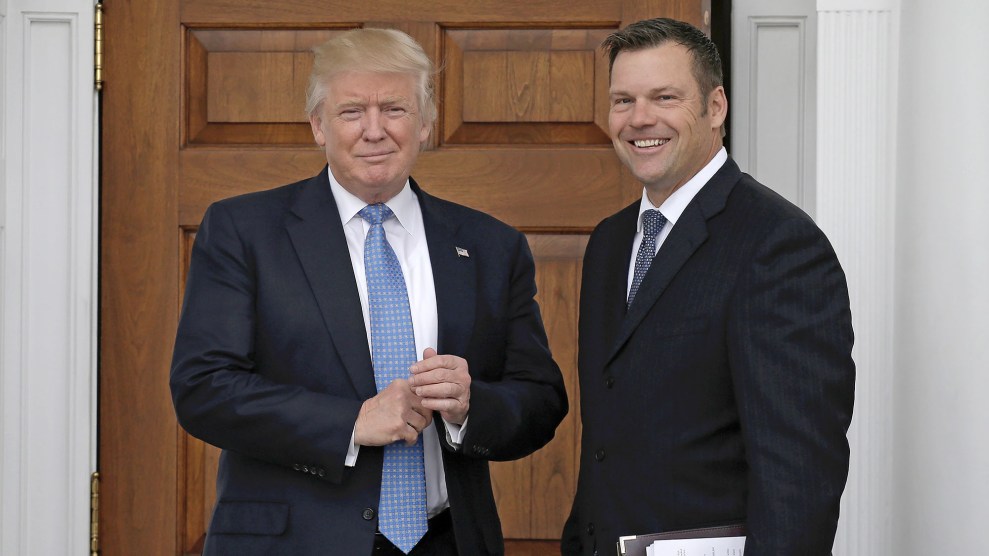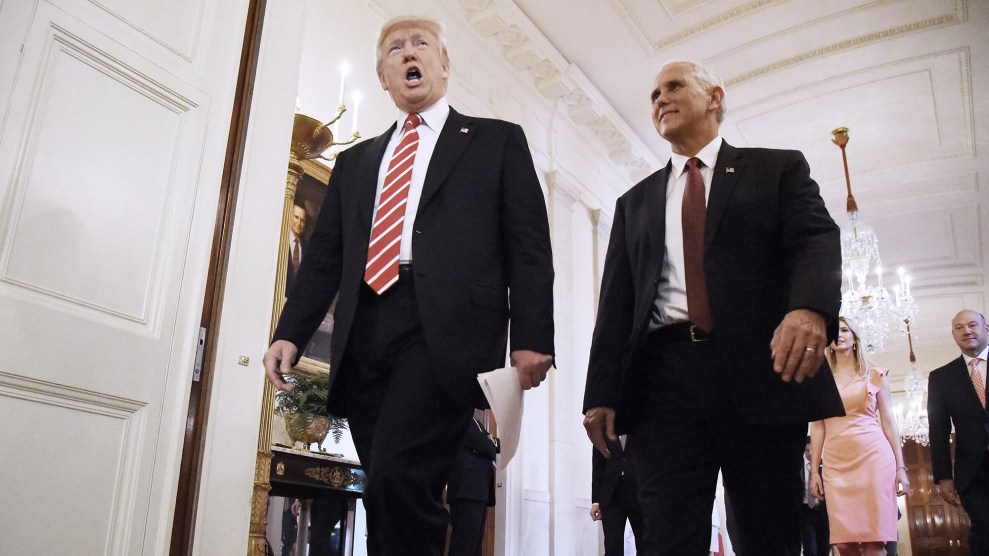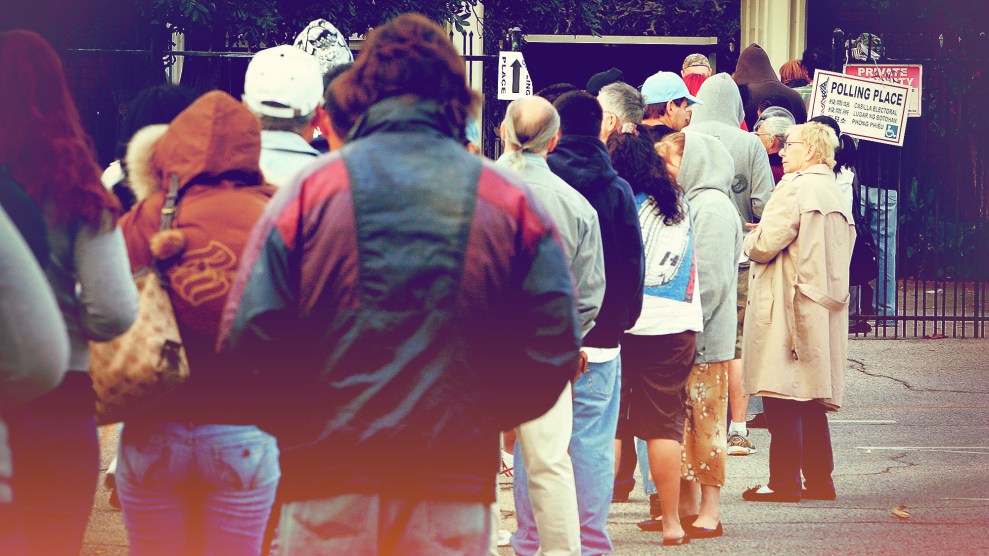
Cover art from the first Alien Invasion report
If President Donald Trump’s latest appointee to his election integrity commission is to be believed, more than a thousand noncitizens have cast ballots in Virginia, potentially changing the outcome of several elections, and many more are likely doing so across the country.
Election officials and experts say there’s plenty of reason to doubt those claims. But they could still provide a blueprint for Trump’s commission, which has so far hinted at tighter restrictions on voting in the name of cracking down on alleged voter fraud, and for the administration’s broader agenda on voting rights.
When Trump set up the Presidential Advisory Commission on Election Integrity in May to investigate vulnerabilities in the country’s elections, voting rights groups warned that it might be a pretense for the administration to pursue a more nefarious goal: to cook up evidence of widespread voter fraud and use that to pass legislation that makes it harder for people to vote. These concerns were reinforced by several of Trump’s appointments to the committee, including vice chair Kris Kobach, who has alleged rampant voter fraud in his home state of Kansas. The committee’s first major action was to request extensive data about every registered voter in every state—a move nearly every state has at least partially resisted.
Last week, Trump announced another appointment to the committee: J. Christian Adams, an attorney who has spearheaded efforts to purge voter rolls across the country. Over the past year, Adams has published two reports alleging widespread voter fraud in Virginia.
Alien Invasion in Virginia and Alien Invasion II claim that more than 5,500 noncitizens have registered to vote in Virginia. Of these, the reports found that 1,852 cast nearly 7,500 ballots over last few decades. Produced by the Public Interest Legal Foundation, the nonprofit law firm where Adams is president and general counsel, and a conservative group called the Virginia Voters Alliance, the reports argue that these ballots could have thrown several close elections in Virginia in recent years. The reports, which use UFO-themed covers and space-alien clip art, were covered by Fox News and other conservative media outlets.
To fix this alleged problem, the reports call for stricter laws that would require people to show proof of citizenship when they vote. Kobach and Adams are currently litigating a case to allow states to require a birth certificate or passport to register. Voting rights groups on the other side of the case argue that doing so violates existing federal law and worry that the commission will recommend changes to that law.

The cover of Alien Invasion II
“This is the real foreign influence on American elections,” Adams said on Fox News this spring. “Foreigners are getting on American voter rolls and, as we documented, casting ballots by the thousands.”
But election law experts say Adams’ methodology seems designed to conjure voter fraud where a likelier explanation for many of the discrepancies may be simple human error in checking the wrong box on a form at the Department of Motor Vehicles.
Adams and his colleagues based their research on forms that Virginians fill out at the DMV, asking them to check a box indicating whether they are citizens. The DMVs send a notice to local election registrars when people check “no” or fail to check either box. The local registrars then send notices to those voters, asking them to confirm their citizenship within 14 days or be removed from the rolls. Adams and his colleagues collected the names of these people who have been removed, as well as at least some of their voter registration forms and voting history. The reports’ conclusion seems to assume that the people removed were indeed noncitizens who had self-reported the truth and been caught, rather than people who might have checked the wrong box or skipped the question accidentally.
“Remember, the 5,500-plus registrants removed for citizenship problems are only those who were caught,” Alien Invasion II states. “They were caught by happenstance, usually by telling the motor vehicle agency they were not a citizen after previously telling the agency they were a citizen. It is not unreasonable to conclude that the full, and unknown, extent of noncitizens registered to vote far exceeds the 5,500-plus who were removed.”
The report continues, “This is an especially sound conclusion when you consider that virtually nothing is being done to detect noncitizens on the voter rolls in Virginia.” But some election officials and experts say this methodology is flawed and could lead to problematic solutions to the exaggerated issue of voter fraud.
“With respect to a commission where allegations of noncitizen voting are so particularly prominent in the founding of the commission and otherwise, and where the concern is those allegations will be wildly inflated beyond any actual facts on the ground,” says Justin Levitt, an election law expert at the Loyola Law School and a former deputy assistant attorney general in the Obama administration who has reviewed the reports, “it is disturbing that the commission should welcome to its ranks somebody who takes this particular approach to investigating voter fraud.”
Adams joined the Justice Department in 2005, when, the department’s inspector general later found, it was illegally using political ideology to fill its Civil Rights Division with conservative lawyers. Working in that division, Adams helped bring—and win—the first-ever Voting Rights Act case alleging black discrimination against whites. He also recommended charges against members of the New Black Panther Party for intimidating white voters, a case that quickly became an obsession of conservative media outlets.
After resigning from the department in protest of the Obama administration’s backtracking on that case, Adams began a campaign to purge voter rolls across the country. He started by threatening and filing lawsuits in small, rural counties with sizable minority populations, before expanding to larger Democratic counties in swing states, with the aim of forcing local election officials to agree to voter list cleansing programs. (Adams denies any political or racial motivations and insists that his efforts do not remove any legitimately registered voters from the rolls.)
As Adams and his colleagues requested the canceled voter registration lists from state and local officials, some county registrars expressed concern to one another that the data would be misconstrued. Adams was aware of their concerns and included in Alien Invasion IIemails that he obtained between local voting officials. “[T]hey are consciously misrepresenting the data they are receiving from us,” Lawrence Haake, the recently retired registrar for Chesterfield County, warned in an email to fellow registrars. The report uses these warnings, as well as a legal dispute with the state about what records Virginia’s Election Commission was legally required to turn over to Adams and his colleagues, to allege a cover-up on the part of Virginia’s election officials.
But in other parts of the reports, and in an email to Mother Jones, Adams acknowledges that the data could be flawed. In the email, Adams argues that if anyone’s to blame for faulty data, it’s the state. “It’s been curious to hear the report attached [sic] because some of the people removed for non-citizenship were really citizens,” he says. “That’s the government screwing up once again. It’s as outrageous that eligible citizens were removed under Virginia’s broken list maintenance policies as it was that aliens were allowed to register and vote. You notice those critics shut up once they realized the ‘misconstrued’ data was really their own mistake in the first place. Virginia’s chief methodology for identifying alien voter registrations by depending on self-reporting should give anyone concerns as it does not reflect the total number registered still undiscovered.”
It didn’t take long for errors in the reports to surface. In May, the conservative Washington Times covered the reports, which it said “should give an early sense for the problems that are likely to be turned up by President Trump’s new voter integrity commission.” The story used the example of Maureen Erickson, who was singled out in Alien Invasion II for listing a Guatemalan address on her registration form. “Ms. Erickson voted in 14 different elections—most recently in 2008—before her registration was canceled,” the report stated.
But Erickson is indeed a US citizen, living in Guatemala as a missionary. Her husband contacted the Times to clarify the situation, and the paper ran a follow-up story explaining the mix-up. “I think it is odd that they chose ‘Maureen Erickson’ as their poster child for voter fraud,” her husband, Todd Erickson, said in an email to the Times. “There was obviously not much additional research done on the person that they held up as an example of this illegal activity.”
Edgardo Cortes, the state election commissioner, explained to the Times, “It happens all the time where people accidentally indicate ‘no’ to citizenship and either don’t receive the letter or don’t return it in time before the removal happens.” (Cortes did not respond to requests for comment from Mother Jones.)
Anna Leider, the registrar for the city of Alexandria, in northern Virginia, says that people who are removed from the rolls due to how they filled out their forms at the DMV often reregister later. “In Alexandria, most of the people who were canceled for citizenship later reregistered,” she says. “It was an error at DMV. It was not that they really were not citizens. I won’t say that there are no noncitizens who have gotten registered to vote in Virginia, but the numbers they cite are wildly inflated.”
The reports target Leider, whom Adams sued last year as part of his work to force jurisdictions to purge their voter rolls. The webpage for Alien Invasion II has an illustration of space aliens with a sign pointing toward Alexandria and a caption that reads, “Take us to your Leider.”
Levitt, the former Justice Department official, says the data analysis in Adams’ reports was “not just incredibly inflated; designed—and specifically designed—to get inaccurate information.” He reached out to some of the thousands of people named in the reports for having their registrations canceled. (Mother Jones also called more than a dozen people on the list but none responded to requests for comment.) “It is possible that a few of the individuals that he’s mentioned were indeed ineligible, but I did speak to citizens who were falsely accused of registering while noncitizens, which means they were falsely accused of committing felonies based on research that Mr. Adams was warned specifically by officials did not mean what he wants it to mean,” he says. “They are livid. The people I talked to include naturalized citizens, they included native-born citizens, at least one service member.”
Asked by email if he was concerned about mislabeling legal voters as felons, Adams replies, “Again, that would be Virginia’s mistake, not ours. Why don’t you ask them why they are removing eligible voters? You should applaud our efforts and finding this, not snipe.” Adams has a point: Virginia’s system does appear to remove thousands of citizens from the rolls due to mistakenly checked boxes at the DMV. But he hasn’t seen that as a reason to question his reports’ findings or to reconsider his full-throated claims of fraud.
The reports include the personal information of thousands of voters, including their names, addresses, birth dates, and telephone numbers, along with the implication that these people have committed felonies. It also initially included some voters’ Social Security numbers, although these were removed in a later version. Adams says the state made all of this information public and is to blame for any inappropriate disclosures. “The Commonwealth of Virginia published the underlying reports for PILF ‘unredacted’ in compliance with local open records law,” he writes. Nonetheless, publishing these people’s names and information with the implication that they committed voter fraud could open Adams and his colleagues to allegations of defamation, says David Ardia, a University of North Carolina law professor who specializes in media law.
Responding to a series of follow-up questions, Logan Churchwell, a spokesman for the Public Interest Legal Foundation, replied, “When you have a serious question, get back to us and we’ll answer it. The report clearly stated what the records were and contemplated there were errors by the government. Nor did it call anyone criminals.”The reports make repeated references to criminality; Alien Invasion in Virginia states, “Each of the aliens we have discovered to have registered or voted has likely committed a felony.”
If Trump’s election commission is able to collect voter data from enough cooperating states, it then plans to compare the data with various federal databases in order to find cases of fraud, a process that experts say will result in thousands of false positives. But if Adams’ Alien Invasion reports are any indication, the commission might not find that disqualifying.














